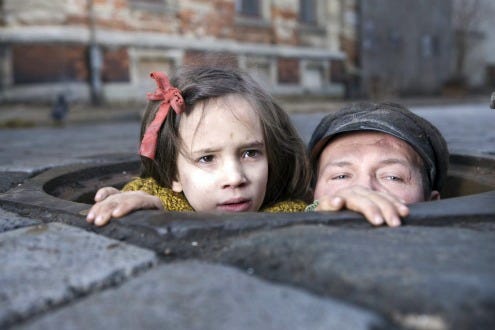In Darkness

Was ever a film more aptly named than "In Darkness"? This true story about a group of Polish Jews who hid out in the sewers under their town for more than a year to escape the Nazi regime is a harrowing and deeply affecting tale with a solemn, at times morbid, undertone. The film, directed by the great Polish director Agnieszka Holland ("Europa, Europa"), often exists in deep inky pools of little light.
The eye can hardly make out anything beyond a few fingers, the whiskers and feet of the ever-present rats and perhaps a pair of eyes staring out from the self-imposed abyss. It reminds of one of John McCain's favorite quips, "It's always darkest before it turns totally dark."
Watching it is an often excruciatingly sad affair, but for those patient enough to endure the hard journey, there is joy in the human perseverance it spotlights. The movie well deserves its Oscar nomination for Best Foreign Language Film.
The movie, based on a book by Robert Marshall (screenplay by David F. Shamoon), begins unexpectedly. A pair of men wearing rough clothes are ransacking a ritzy house. A pretty young girl accompanied by a young man in a German uniform walk in on them. After a fight, the head thief stands over the fallen Nazi and berates the girl in the Polish language they share: Find a Polish boy to fuck instead, he orders.
This is Socha, who ostensibly is an inspector of the sewers under the town of Lvov but is really a dabbler in various schemes to make himself ... well, certainly not rich, but more comfortable. He shares a cramped one-room apartment with his wife and daughter, whom he loves deeply and wants to provide for. If that means stealing, or taking bribes, or extorting money, then so be it.
Robert Wieckiewicz plays Socha with conviction and and a rough sort of purity. His blocky face and burly torso give the impression of a man not given to giving up easily. Socha begins the story motivated purely by self-interest and by the end, he has become a sort of Polish Oskar Schindler.
When Socha discovers a group of Jews who have burrowed out of their ghetto and into his sewer tunnels, he instantly sees an opportunity. For a handsome daily fee, he will lead them to safety and hide them from the Nazis. When the Germans decide to empty all the Jews out of the ghetto and put them into concentration camps, a small horde of them make their way into the sewers. Socha is adamant: He can only hide 10. He coldly forces the Jews to decide which of their number will be saved.
The leader of the remaining Jews is Mundek (Benno Fürmann), who calls himself Pirate and is something of a nefarious counterpart to Socha himself. The two are wary of each other, mentally circling one another like wolves, but eventually form a bond that's not exactly one of trust, but perhaps mutual regard for the other's steadfastness.
Chiger (Herbert Knaup) is a wealthy professor who insists upon bringing his entire family, a wife and two small children, into hiding in the labyrinths of the sewers. Klara (Agnieszka Grochowska) is a young woman who frets for her sister, who refused to make the journey into the dank underground and (perhaps?) still lives in one of the camps. Mundek clearly adores her, but is respectful of Klara's fears not to foist his intentions upon her until the fate of her sibling is resolved.
As the months roll by, the situation becomes more and more desperate. Socha moves them from one corner of the sewers to the other to keep them hidden from the Germans, who have reports of Jews living among the rats. Socha is friends with the Ukranian local commander and leads him on wild goose chases.
Meanwhile, Socha's financial killing becomes more of a burden. The local grocer, suspecting that the huge load of food he buys is not for his family, starts charging him double, eating into his profits. Soon, Chiger, who had been bankrolling the operation, runs out of cash and has to trust Socha with some jewels he had buried aboveground for emergencies. Socha's wife (Kinga Preis) threatens to leave him because of his insistence on helping Jews to the point where his own family is endangered.
Some people may tire of these troubling tales from World War II, but I never do. It was such a pivotal event in human history, you could keep telling stories from it for 100 years and never come near to exhausting all the stories of human grace and debasement. "In Darkness" does both, with power and filthy majesty.
4.5 Yaps

